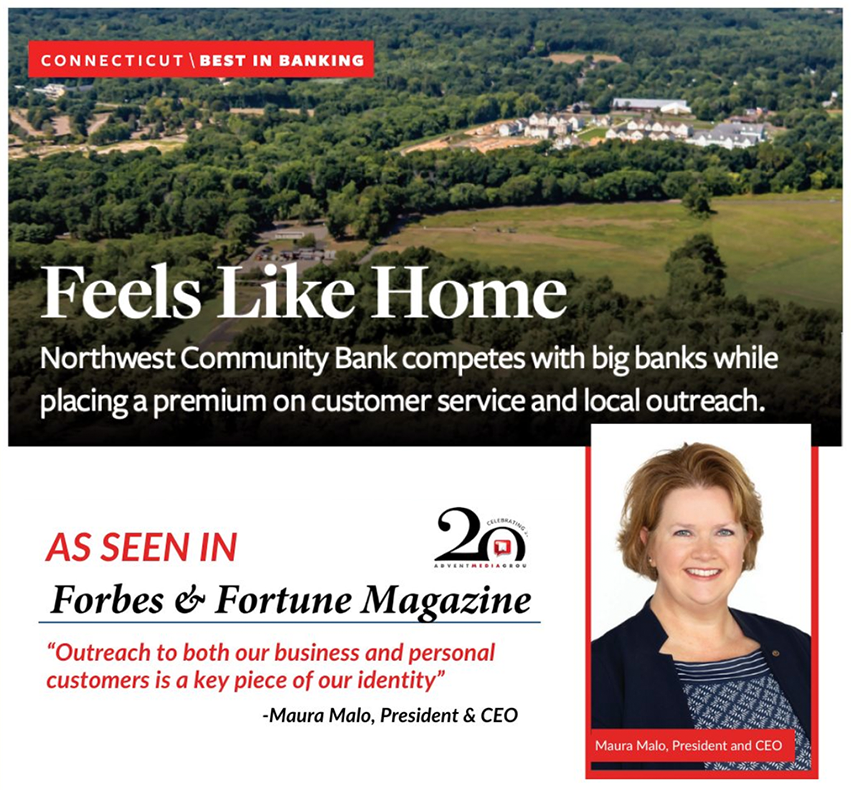Collinsville Bank – A Division of Northwest Community Bank has been serving your community for over 150 years. Our philosophy revolves around a genuine commitment to meeting the needs of the communities we serve.
Community News

What's Happening In Our Community
Our Community News
Our printable forms are in the Adobe™ Portable Document Format (PDF) format. If you do not have Acrobat™ Reader™, you can download it free.
Feels Like Home - Northwest Community Bank featured in Forbes and Fortune
We’re proud of our history and how we continuously expand upon it. So we appreciate the opportunity to be interviewed by Forbes and Fortune magazines and included in a special section of their publications. Click to read the article.
Forbes and Fortune August 2024
The Benefits of Banking Locally - President and CEO Maura A. Malo on WTNH
NEW HAVEN, Conn. (WTNH)- Maura A. Malo, President and CEO of Northwest Community Bank joined Connecticut’s Morning Buzz Host Natasha Lubczenko to discuss some of the benefits of using a community bank.
Maura shares her thoughts about why it’s important for people to bank locally with their community bank, saying, “It’s so important for people to bank locally with their local community bank. I think a lot of the big differentiators between us and a lot of the large regionals, is the fact that we were started by our depositors in 1860. So, we’ve been around a really, long time, and all of our decisions are made locally. So Northwest Community Bank, we’re located in Winstead, Connecticut. All of our Executive Team, our Board of Directors, we’re located right here in the area, so we understand what people need.” Read the full article.
Investing in a Bank You Trust - President and CEO Maura A. Malo on WFSB
ROCKY HILL Conn. (WFSB) The recently appointed President and CEO, Maura O’Sullivan Malo, talks with WFSB about why Northwest Community Bank is a great partner for your personal or business needs. Click here to view the segment.
Maura A. Malo Becomes President and CEO of Northwest Community Bank

(WINSTED, CT) After serving as President and Chief Executive Officer Elect since January 2023, Maura A. Malo succeeded retiring President and CEO Stephen P. Reilly on September 2, 2023.
Mrs. Malo has 30 years of senior level experience in the banking industry. Her previous positions at the bank include Executive Vice President and Chief Operating Officer, Chief Risk Officer and Internal Auditor. She was an FDIC Bank Examiner from 1993-2003 before she joined Litchfield Bancorp – A Division of Northwest Community Bank, in 2003. She holds an MBA from Rensselaer Polytechnic Institute and a BS from Western New England University. She is also a graduate of the National School of Banking, and has received the New Leaders in Banking Award from the Connecticut Bankers Association.
Maura Malo currently serves on the boards of FISH, Warner Theatre, Northwest CT Chamber of Commerce, and has served on numerous other boards in the region. She has been a Girl Scouts of CT Troop Leader since 2006. She and her husband Stephen Malo and their two daughters reside in Litchfield, CT.
Northwest Community Bank Promotes James Rusiecki, Jr., CTP, to Executive Vice President and Chief Operating Officer

Northwest Community Bank President & CEO Stephen P. Reilly and the Board of Directors recently announced the promotion of James Rusiecki, Jr. to Executive Vice President and Chief Operating Officer.
Rusiecki joined the Bank in June 2018 as Senior Vice President and Director of Treasury Management Services following 24 years of senior level positions at other institutions. Bank President Stephen Reilly states, “Jim was instrumental in developing our Treasury Management department, vetting and onboarding vendors, and ensuring that we have the deposit products and services that our commercial customers require. He was also a leader in the merger process ensuring that the consolidation of the three core databases occurred with minimal customer impact. Following the consolidation, Jim was promoted to Executive Vice President & Director of Treasury Management & Operations, where he has implemented new processes in the Operations Department.”
Jim has been recognized for his accomplishments in several professional organizations. He also is proud of his many years coaching youth baseball in Southington, where he resides with wife Dora and children.
Northwest Community Bank Names Gregori P. Tonon Executive Vice President and Chief Lending Officer

Northwest Community Bank President & CEO Stephen P. Reilly and the Board of Directors recently announced the promotion of Gregori P. Tonon to Executive Vice President and Chief Lending Officer.
Tonon joined the bank in January 2014 as a Vice President and Commercial Loan Officer. In 2021, he was promoted to Senior Vice President and in 2022 to Commercial Team Leader. Bank President Stephen Reilly states, “Over the past 9 years, Greg has distinguished himself as an accomplished commercial lender, with the ability to develop strong relationships with his customers and referral sources. He has also worked with his team to manage their portfolios, pipelines, and loan production, while adhering to the Bank’s conservative lending philosophy.”
Tonon graduated from the multi-year ABA Stonier School of Banking program, which includes a leadership certificate from The Wharton School. He volunteers in the community, serving on the Board of Directors for the Torrington-Winsted Rotary, the Board of the United Way, Northwest CT Chamber of Commerce and the Finance Committee at the Golf Club of Avon. He and his family reside in Avon.
Northwest Community Bank recently named Andrew St. Onge Assistant Vice President and Branch Manager of its Simsbury, CT office.
 Mr. St. Onge is a graduate of University of Connecticut, began his career in banking in 2013 and has been adding retail banking and branch management to his experience since then. In his own words, he is “customer-focused and committed to being involved in the community.”
Mr. St. Onge is a graduate of University of Connecticut, began his career in banking in 2013 and has been adding retail banking and branch management to his experience since then. In his own words, he is “customer-focused and committed to being involved in the community.”
Among his volunteer activities, Mr. St. Onge is currently a board member of Farmington Valley VNA and Granby Chamber of Commerce. He has had previous involvement with the Plainville Rotary Club, Junior Achievement and CAHS: Money School. He is a resident of Avon.
Northwest Community Bank is a mutually owned state-chartered bank, headquartered in Winsted, Connecticut since 1860. The bank has branches in Avon, Granby, New Hartford, Simsbury, Torrington, and an academic branch at Northwestern Regional High School in Winsted. Collinsville Bank – A Division of Northwest Community Bank has branches in Collinsville, Canton and Farmington; and Litchfield Bancorp – A Division of Northwest Community Bank has branches in Litchfield, Lakeville, Torrington, Watertown and Washington Depot.
Favarh's New Adaptive Wellness Center Campaign Receives Boost from Collinsville Bank - a Division of Northwest Community Bank
The campaign for the construction of the Adaptive Wellness Center by Favarh, the Arc in the Farmington Valley, recently received a $35,000 donation from Collinsville Bank, A Division of Northwest Community Bank. The Center is being created to provide the individuals Favarh serves more opportunities to enjoy a healthy and active lifestyle. The Center will include a large multi-use floor to be used for a variety of mindfulness activities, sports, recreation, and theater programs.
President and CEO of Connecticut Mutual Holding Company and Northwest Community Bank Stephen Reilly says, “Along with Gary Roman and everyone at Collinsville Bank, A Division of Northwest Community Bank, we are so pleased to continue to support the work of Favarh. We know that the new facility will expand Favarh’s capabilities, be beneficial to their clients and become an asset to communities throughout the Farmington Valley region. We look forward to seeing the Center as it adds another great range of valuable services to Favarh.”
Collinsville Bank was established in 1853. Collinsville Bank, A Division of Northwest Community Bank, has branches in Canton, Collinsville and Farmington, Connecticut.
Northwest Community Bank is a mutually owned state-chartered bank, headquartered in Winsted, Connecticut since 1860. The bank has branches in Avon, Granby, New Hartford, Simsbury and Torrington. The main office and an academic branch at Northwestern Regional High School are in Winsted. Northwest Community Bank is a wholly-owned subsidiary of Connecticut Mutual Holding Company. In January 2021, Northwest Community Bank assumed operations of Collinsville Bank, A Division of Northwest Community Bank and Litchfield Bancorp, A Divison of Northwest Community Bank.
Litchfield Bancorp was founded in 1850. Litchfield Bancorp, A Division of Northwest Community Bank, operates in Litchfield, Lakeville, Torrington, Washington Depot and Watertown, Connecticut.
Litchfield Bancorp Distributes Turkeys to Employees & Local Food Pantries
(Litchfield) – Litchfield Bancorp along with Collinsville Bank and Northwest Community Bank have teamed up with Miller Farms to provide turkeys to all its employees. For every turkey handed out to an employee, one is donated to a local community food pantry.
“It’s a small thank you to our staff for all their hard work this year and in turn helps provide meals to those in need. Some of our employees graciously paid it forward and donated their turkey for a grand total of 210 turkeys distributed to the local food pantries.” said Thomas Villanova, President and CEO of Litchfield Bancorp. “This year has been especially challenging for everyone in our communities, but Litchfield Bancorp as well as Collinsville Bank and Northwest Community Bank has weathered difficult times since 1850 and we will continue to be there for our employees, customers and community for many more years to come.
Chief Lending Officer, Robert Teittinen Retires From Litchfield Bancorp
(Litchfield, CT) – On March 31, 2020, Robert Teittinen was due to retire from Litchfield Bancorp. As the Litchfield Bancorp family geared up to wish Bob a happy farewell into this next chapter of his life, we learned that he planned to stay on board and work with the rest of the Commercial Team to help process the Payroll Protection Program loans during the last few months surrounding the Covid-19 Pandemic. Although we had some unexpected extra time with Bob, it is now time to say those farewells after an unforgettable 9 years with Litchfield Bancorp.
Laura Murphy promoted to Litchfield Bancorp Torrington Branch Manager
 (Litchfield, CT) – Thomas Villanova, President & CEO of Litchfield Bancorp is pleased to announce the promotion of Laura Murphy to Branch Manager of the Torrington office, as of March 9, 2020. Laura Murphy began her banking career as a Teller in 2008 and since then has held multiple positions in retail banking, including Creative Marketing. Starting her career with Litchfield Bancorp, Laura has called the Torrington office her home for the last eleven years, successfully climbing through the ranks to this position.
(Litchfield, CT) – Thomas Villanova, President & CEO of Litchfield Bancorp is pleased to announce the promotion of Laura Murphy to Branch Manager of the Torrington office, as of March 9, 2020. Laura Murphy began her banking career as a Teller in 2008 and since then has held multiple positions in retail banking, including Creative Marketing. Starting her career with Litchfield Bancorp, Laura has called the Torrington office her home for the last eleven years, successfully climbing through the ranks to this position.
“Tom and I are so proud to announce this promotion. Laura’s work ethic, interpersonal skills, intelligence, incredible knack to get things done, and her desire to take on any new assignment made this an easy decision.” Paul McLaughlin, Executive Vice President and Chief Operating Officer of Litchfield Bancorp said when making the announcement.
Laura is a 2014 graduate of “Investing in People,” a leadership development program through Learning Dynamics, as well as a 2015 graduate of “Leadership Northwest,” a program through the Northwest Connecticut Chamber of Commerce designed to develop resourceful, motivated business leaders. Laura is currently attending the Connecticut School of Finance and Management, a two-year program sponsored by the Connecticut Bankers Association, with an expected graduation to be held in 2021.
Laura is active in the community, volunteering with the United Way of Northwest and a member of Northwest Connecticut Chamber of Commerce’s Young Professionals Organization.
Christine Bascetta-Gath Promoted to Chief Lending Officer of Litchfield Bancorp
 (Litchfield, CT) – Thomas Villanova, President & CEO of Litchfield Bancorp is pleased to announce the promotion of Christine Bascetta-Gath to Chief Lending Officer for the bank, as of January 31, 2020. Christine Bascetta-Gath began her banking career in 2010 and since then she has worked in multiple areas of commercial banking.
(Litchfield, CT) – Thomas Villanova, President & CEO of Litchfield Bancorp is pleased to announce the promotion of Christine Bascetta-Gath to Chief Lending Officer for the bank, as of January 31, 2020. Christine Bascetta-Gath began her banking career in 2010 and since then she has worked in multiple areas of commercial banking.
Christine Bascetta-Gath began her banking career in 2010 and since then she has worked in multiple areas of commercial banking. Prior to Litchfield Bancorp, Christine was Vice President & Commercial/Wholesale Banker at United Bank. Christine was responsible for determining the lending needs and banking services for existing and potential customers. Prior to that, she was VP, Manager in Commercial Lending & Administration with Torrington Savings Bank. Christine began her employment with Litchfield Bancorp in late 2018 as Senior Vice President, Commercial Lending Officer. This promotion comes to Christine, as Bob Teittinen announces his retirement as of March 31, 2020.
New Chair for Litchfield Bancorp Board of Directors
(Litchfield, CT) – Jane Hinkel has been elected Chairman of Litchfield Bancorp’s Board of Directors. Mrs. Hinkel has been a member of the Bank’s Board of Directors since 1994. She has also been a director of The Connecticut Mutual Holding Company, which consist of Litchfield Bancorp, Northwest Community Bank and Collinsville Bank since 2006 in addition to serving as Chair of Litchfield Bancorp’s Finance Committee as well as serving on the Executive, Strategic, Compensation and Loan committees.
Fraud Alerts & Online Safety
Northwest Community Bank is always looking out for our customers. For your protection we have provided some information on specific types of scams and frauds which you should be aware of:
Beware of Scams Online, Email, Phone or Mail
The number of fraud attempts and incidents—as well as identity theft—continues to rise, and we are working vigorously to offer the best security for you. By working together to make security a priority, we can help in safeguarding your important information.
With constant monitoring, if we suspect a problem with your debit card you will receive a telephone call asking you to verify the validity of a transaction. The automated phone call will display 1-844-682-4502 as the caller ID. If there is no answer, the system will leave a message requesting a call back and will provide a case number for the call. When calling back, the Representative will identify themselves as “Fraud Detection Center.” If you do not return the call, a live Fraud Analyst will reach out to you to verify the transaction. In these situations, we will provide the necessary card and transaction information for you to verify and will not ask you to disclose any further card or account related information. If you have any doubts about the call, contact the bank and we can verify the validity of the call.
Other common scams may come from email or text messages. Know that we will not ask you to disclose or verify your username, password, identity or account/debit card specific information via email or text message. If you suspect that an email or text message is coming from a source posing as Northwest Community Bank or the Divisions, Collinsville Bank and Litchfield Bancorp, do not click or respond and notify us.
There has been a significant increase in fraudulent check scams. Be wary of receiving unexpected checks in the mail and report any unusual activity on your account. If thieves gain access to your account information and/or your personal identity documents, they may use this information to access your account by impersonating you.
In this complex, ever-changing time, we monitor, learn and forecast to prevent fraud, and where necessary address unlawful activity. The best defense is for you to be aware of scams and be diligent about the security of your personal information. Together we can defend against the ramifications of fraudulent activity.
For more information on scams, visit the Consumer Financial Protection Bureau at:
www.consumerfinance.gov/consumer-tools/fraud/ or call 855-411-2372.
Important Information About Text Messaging Scams
Like all forms of scams and schemes, incidents of fraudulent text messaging have been increasing nationally, as well as locally. Scammers send text messages that appear to come from your bank, even using proper names of personnel to make the message look familiar and legitimate. They will use tricks, such as scare tactics with false problems or special offers, to get your attention and to gain access to your personal information and/or accounts.
First and foremost, if you receive a text message appearing to have been sent by Northwest Community Bank, Collinsville Bank – A Division of Northwest Community Bank, or Litchfield Bancorp – A Division of Northwest Community Bank, do not click any links or reply to the message. We will never ask for your personal information through a text message.
We will NOT ask you to provide personal information by text, to click on a link or to call a telephone number in the spam text. Be aware that some messages may be attempting to frighten you with account problems, debit card cancelation, late payment; others may tempt you with special offers or routine updates on your account information. Our main caution remains: we will never ask for your personal information through a text message – and you should not act on any text message appearing to come from us.
We are careful in how we communicate with our customers and strive to maintain the highest-level security protection possible. We have significant fraud protection shields in place, and more information is available on our website. Plus we are always accessible to assist you with your concerns by contacting your local branch.
If you have any questions, please contact your local branch so we may assist you.



